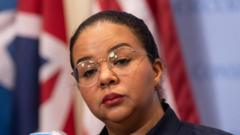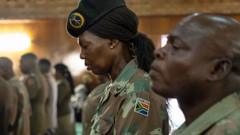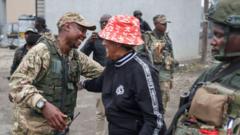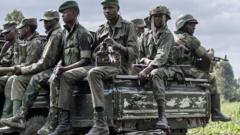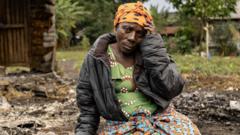The UN reports a devastating toll of at least 700 casualties in a recent surge of violence in the Democratic Republic of Congo, raising urgent calls for intervention and support.
Atrocities in Eastern DR Congo: Over 700 Dead in Escalating Conflict
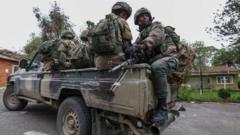
Atrocities in Eastern DR Congo: Over 700 Dead in Escalating Conflict
Tensions rise as M23 rebels advance towards strategic cities, creating a humanitarian crisis.
The deteriorating situation in Goma, the largest city in eastern Democratic Republic of Congo, has reached alarming proportions as intense fighting has reportedly claimed the lives of at least 700 individuals since Sunday. According to UN spokesman Stéphane Dujarric, another 2,800 people have sustained injuries with the M23 rebel group, allegedly supported by Rwanda, having successfully taken control of North Kivu province's capital.
Reports indicate that M23 forces are now advancing toward Bukavu, the capital of South Kivu. The ongoing conflict, deeply rooted since the 1990s, has escalated sharply in recent weeks, revolving around M23's claims of fighting for the rights of the ethnic Tutsi minority against the Congolese government's assertion that these rebels are intent on seizing the region's rich mineral resources.
Dujarric noted that the casualty figures provided are based on an evaluation conducted by the World Health Organization alongside local health authorities between Sunday and Thursday. He cautioned that the numbers were likely to rise as the situation continues to develop.
In response to the encroaching threat, the Congolese military has erected a defensive line along the Goma-Bukavu route, while civilian volunteers have joined the effort to protect Bukavu. One determined local resident remarked to reporters, "I am ready to die for my country."
South Kivu's governor, Jean-Jacques Purusi Sadiki, claimed that government forces and their allies are successfully holding back M23's advance, a statement that requires independent verification. Earlier this week, M23 declared their intentions to push onward to the national capital of Kinshasa, situated approximately 2,600 km (1,600 miles) to the west.
Thérèse Kayikwamba Wagner, the foreign minister of DR Congo, condemned Rwanda's actions, labeling them as an illegal occupation and a move towards regime change. Wagner accused the international community of allowing Rwandan President Paul Kagame to evade accountability for violations of international law, an assertion Rwanda's government spokesperson, Yolande Makolo, strongly rejected. She clarified that Rwanda's military involvement was solely to prevent any spillover of the conflict into its territory.
Last year, UN experts estimated that 3,000 to 4,000 Rwandan troops were collaborating with the M23 in eastern DR Congo. In a recent crisis summit in Zimbabwe, the Southern African Development Community (Sadc) voiced solidarity with DR Congo and pledged continuing support for its sovereignty and territorial integrity, even dispatching peacekeeping forces, primarily from South Africa, to help quell the violence.
The humanitarian crisis has worsened significantly in light of the conflict, with residents in Goma facing severe shortages of food, clean water, and medical supplies. According to Shelley Thakral from the UN's World Food Programme, access issues have severely hindered supply chains, exacerbating the plight of civilians. Since the beginning of 2025, over 400,000 people have fled their homes due to the unrest.
As Africa's second-largest country, which shares its borders with nine nations, DR Congo's ongoing conflict echoes a history mired in chaos, reminiscent of the 1990s when neighboring countries became embroiled in what has been termed Africa's World Wars.






